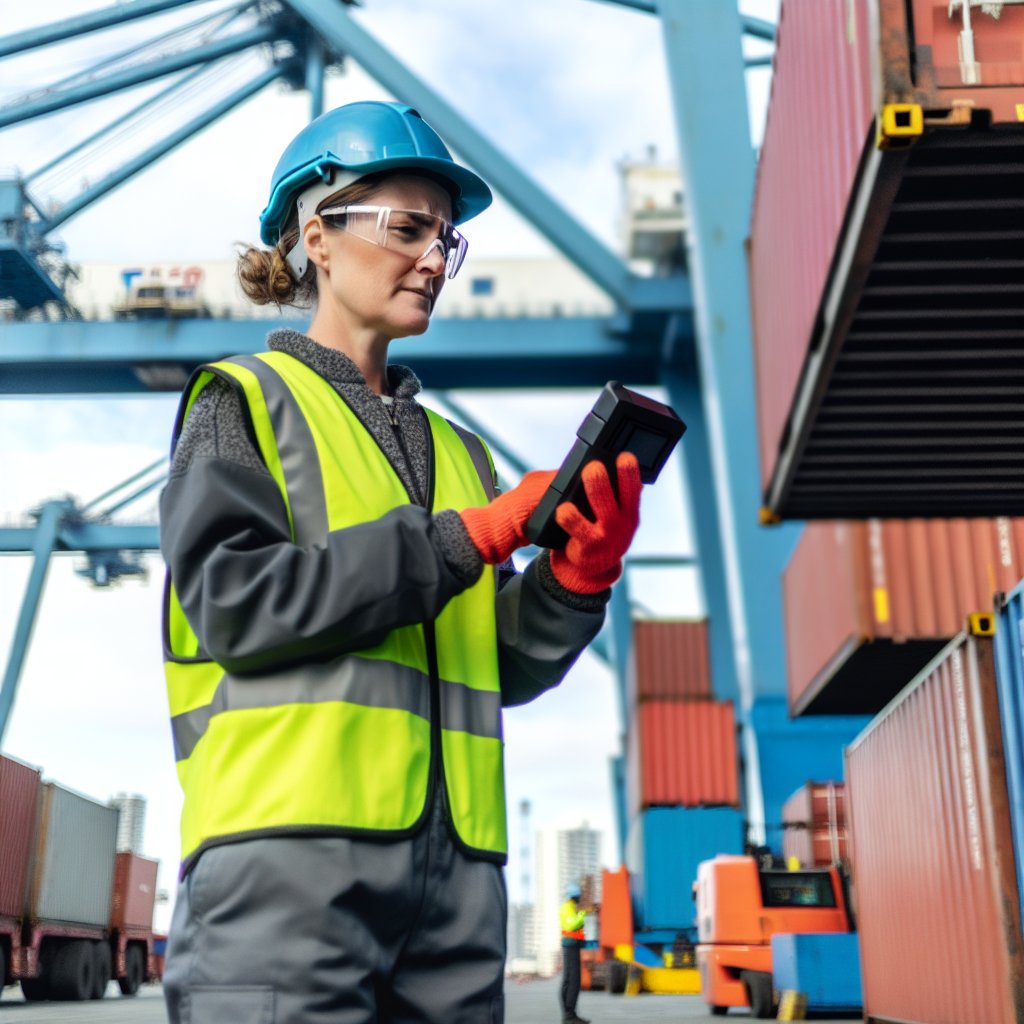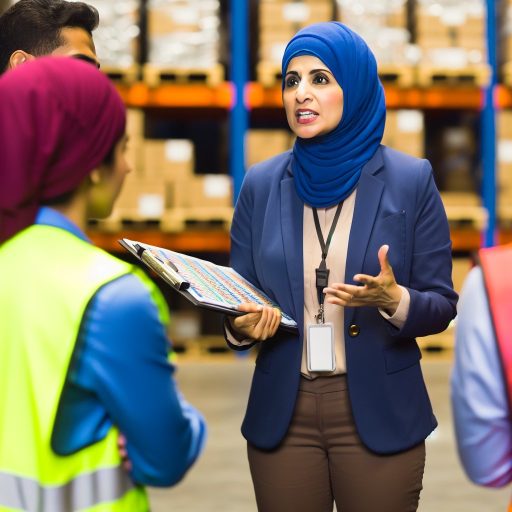Introduction:
Brief overview of the importance of port security and safety: Port security is crucial in preventing illegal activities such as smuggling and terrorism. It safeguards trade routes and protects the wellbeing of port personnel.
Explanation of the role of dockworkers in ensuring port security: Dockworkers play a vital role in maintaining port security. They inspect incoming cargo, report suspicious activities, and follow strict security protocols to prevent unauthorized access.
Importance of Port Security:
Maintaining port security is essential. It protects national interests, trade, and the environment from potential threats. Port facilities are vulnerable targets that require robust security measures. These measures safeguard against security breaches and ensure uninterrupted operations.
Dockworkers’ Responsibilities in Port Security:
Dockworkers are responsible for conducting thorough inspections. They inspect cargo shipments and identify irregularities or discrepancies. These discrepancies may pose security risks. Their attention to detail and diligence help prevent illegal activities and contraband from entering the port.
Report Suspicious Activities:
Dockworkers are trained to be vigilant. They report any suspicious activities, unauthorized individuals, or packages. Reports are made to the appropriate authorities promptly. This proactive approach enhances port security. It also contributes to a safer working environment for all personnel.
Follow Security Protocols:
Dockworkers must adhere to strict security protocols and procedures. They restrict access to sensitive areas, secure cargo handling equipment, and ensure compliance with security guidelines. By following these protocols, dockworkers help mitigate potential risks. They protect port operations from security threats.
Role of Dockworkers in Safeguarding Port Security:
Dockworkers play a critical role in ensuring port security. They inspect cargo, report suspicious activities, and follow security protocols. Their dedication and vigilance are essential. They safeguard port facilities and maintain a secure environment for all personnel.
History of port security:
- Overview of the evolution of port security measures
- Importance of port security in safeguarding national interests
- Introduction of regulations like the Maritime Transportation Security Act
Evolution of Port Security Measures
Port security has always been a critical aspect of maritime operations.
This dates back to ancient times when ports were vital for trade and defense.
As maritime trade expanded, the need for increased security measures grew.
Modern port security has evolved due to advancements in technology.
Changes in the global security landscape have also influenced it.
Ports now face a wide range of threats.
Threats include terrorism, smuggling, and cyber-attacks.
This makes security a top priority for port operators and government authorities.
Importance of Port Security
Port security plays a crucial role in safeguarding national interests.
It protects critical infrastructure and ensures the smooth flow of goods.
Preventing illicit activities is also essential.
A secure port contributes to economic prosperity and public safety.
Without adequate security measures in place, ports are vulnerable.
Transform Your Career Today
Unlock a personalized career strategy that drives real results. Get tailored advice and a roadmap designed just for you.
Start NowVulnerabilities can lead to significant threats for the country.
Terrorist attacks and drug trafficking pose serious risks.
Regulations like the Maritime Transportation Security Act
In response to growing security challenges, governments introduced regulations.
These regulations strengthen security measures in ports.
They enhance the resilience of port operations.
One such regulation is the Maritime Transportation Security Act (MTSA).
It was passed by the U.S. Congress in 2002.
The MTSA requires port facilities to implement security plans.
These plans must address various security threats.
Threats include terrorism, cargo theft, and sabotage.
The act mandates the screening of personnel and cargo.
It ensures the implementation of access control measures.
Surveillance systems are also mandated for monitoring port activities.
Overall, regulations like the MTSA have improved port security significantly.
These measures ensure ports remain secure and resilient.
Dockworkers play a crucial role in maintaining security.
Dockworker Responsibilities in Port Security:
As a crucial part of port security and safety, dockworkers play a significant role in ensuring that the port operates smoothly and securely.
Their responsibilities include:
- Screening Cargo for Prohibited Items
- Reporting Suspicious Activity to Authorities
- Ensuring Compliance with Security Protocols
- Inspecting Containers for Any Security Breaches
Dockworkers are responsible for thoroughly checking all incoming and outgoing cargo to detect any prohibited items that could pose a security risk.
Showcase Your Business Today
Reach thousands of readers actively exploring professional services. Publish your business profile and grow your audience now.
Publish NowThis involves using x-ray machines, physical inspections, and other screening methods to ensure compliance.
They are trained to be vigilant and observant of any suspicious behavior or activities within the port area.
Dockworkers play a crucial role in reporting such incidents to the relevant authorities promptly to prevent potential security threats.
It is essential for dockworkers to adhere to all security protocols and procedures set in place by port authorities.
This includes following proper identification processes, access control measures, and documentation requirements to maintain port security standards.
They are responsible for inspecting containers for any signs of tampering or security breaches.
By conducting thorough inspections, they help to prevent unauthorized access to cargo and ensure that all shipments are secure during transport.
Overall, dockworkers play a crucial role in maintaining port security and safety by diligently carrying out their responsibilities and remaining vigilant at all times.
You Might Also Like: Top Skills Needed for Success as a Maintenance Worker
Training and Certification for Dockworkers:
Dockworkers play a crucial role in maintaining port security and safety.
To ensure they are well-prepared for any security threats, specialized training and certification are essential.
Importance of Specialized Training in Security Procedures:
- Dockworkers need to understand security protocols to prevent unauthorized access to ports.
- Training includes recognizing suspicious activities and responding appropriately in emergency situations.
- Knowledge of communication procedures for coordinating with security personnel is crucial for dockworkers.
Certification Requirements for Handling Hazardous Materials:
- Dockworkers handling hazardous materials need special certification to ensure proper handling and storage.
- Certification includes training on handling, packaging, and transporting dangerous goods safely.
- Regular certification renewal is necessary to stay updated on any changes in regulations or best practices.
Role of Continuous Education in Staying Updated on Security Protocols:
- Ongoing education is crucial for dockworkers to stay informed about the latest security threats and measures.
- Refreshers on security procedures help dockworkers respond effectively to evolving security challenges.
- Regular training sessions ensure dockworkers are equipped to handle any security incidents with efficiency and competence.
By investing in training and certification for dockworkers, ports can enhance their security measures and ensure the safety of all personnel and goods passing through their facilities.
Gain More Insights: Understanding the Pipelayer’s Work Environment
Collaboration with law enforcement:
In order to enhance port security and safety, dockworkers play a crucial role in collaborating with law enforcement agencies.
This collaboration is essential to ensure the protection of the port facilities, personnel, and cargo from various security threats.
Dockworkers often work closely with local, state, and federal law enforcement agencies to strengthen security measures and respond effectively to any potential risks.
This partnership is built on trust, communication, and a shared commitment to safeguarding the port environment.
Coordination in responding to security threats is a key aspect of the dockworkers’ role in port security.
In the event of a security breach or threat, dockworkers are trained to follow established protocols and work in tandem with law enforcement to address the situation swiftly and efficiently.
Sharing intelligence is another vital component of the collaboration between dockworkers and law enforcement.
By exchanging information about potential risks, suspicious activities, or emerging threats, dockworkers and law enforcement can proactively prevent security incidents and protect the port community.
The partnership between dockworkers and law enforcement agencies extends beyond daily operations and into emergency preparedness and response.
Training exercises, drills, and tabletop exercises are conducted regularly to enhance coordination and test the effectiveness of security protocols.
In addition to physical security measures, such as access control and surveillance, intelligence sharing enables dockworkers and law enforcement to identify and mitigate security vulnerabilities proactively.
This proactive approach is crucial in preventing security incidents and ensuring the safety of the port.
Overall, collaboration with law enforcement is fundamental to the dockworkers’ role in port security and safety.
By working together, sharing intelligence, and coordinating responses to security threats, dockworkers contribute significantly to the overall security posture of the port.
They help maintain a safe and secure environment for all stakeholders.
- Partnership between dockworkers and law enforcement agencies
- Coordination in responding to security threats
- Sharing intelligence to prevent potential risks
Gain More Insights: Painting for Beginners: Tips to Get You Started
Challenges Faced by Dockworkers in Maintaining Security
Ensuring the security and safety of ports is a critical responsibility that falls on the shoulders of dockworkers.
The role of dockworkers in port security cannot be overstated, as they play a vital role in preventing potential threats and ensuring smooth operations within the port area.
High Volume of Cargo Handling:
- The high volume of cargo being handled at ports can pose a significant challenge to dockworkers.
- This high volume often leads to limited time for thorough security checks on each shipment.
- As a result, there is a risk of overlooking potential security threats amidst the rush of cargo handling.
Keeping Up with Evolving Security Threats:
- The nature of security threats is constantly evolving, requiring dockworkers to stay updated on the latest trends.
- From cybersecurity threats to physical breaches, dockworkers must be prepared to address a wide range of security risks.
- Training and education on new security protocols are essential to keep pace with these evolving threats.
Balancing Security Measures with Operational Efficiency:
- Implementing stringent security measures is crucial for safeguarding ports, but it can also impact operational efficiency.
- Striking a balance between security protocols and smooth operations is a delicate task for dockworkers.
- Efficient coordination between security checks and cargo handling processes is essential to avoid disruptions.
Dockworkers face numerous challenges in maintaining security at ports. It is imperative for them to adapt to the changing landscape of security threats, manage the high volume of cargo efficiently, and strike a balance between security measures and operational efficiency to ensure a safe and secure port environment.
See Related Content: Warehouse Worker Salary: What to Expect in the US

Technology in Enhancing Port Security:
Technology plays a crucial role in enhancing the security and safety of ports around the world.
As dockworkers, being aware of the latest technological advancements can significantly improve our ability to ensure a secure working environment.
Here are some key areas where technology is making a difference:
- Use of advanced screening technologies for cargo inspection
- Implementation of digital documentation for tracking shipments
- Role of drones and CCTV cameras in monitoring port activities
Advanced screening technologies are essential for inspecting incoming and outgoing cargo.
Advanced screening technologies such as x-ray scanners and explosive trace detection systems are now commonly used to inspect shipments.
These technologies allow dockworkers to quickly and efficiently scan containers for any potential threats or illegal items.
This helps to prevent dangerous goods from passing through the port undetected.
Showcase Your Business Today
Reach thousands of readers actively exploring professional services. Publish your business profile and grow your audience now.
Publish NowAnother key area where technology is improving port security is in the implementation of digital documentation systems for tracking shipments.
By digitizing shipping records and documentation, dockworkers can easily track the movement of cargo throughout the port.
This ensures that all shipments are accounted for and securely stored.
This not only enhances efficiency but also helps to reduce the risk of unauthorized access to sensitive cargo.
Drones and CCTV cameras play a vital role in monitoring port activities and enhancing overall security.
Drones can be used to conduct aerial surveillance of the port, providing real-time footage of any suspicious activities or intrusions.
CCTV cameras, strategically placed throughout the port, help to continuously monitor the premises.
This ensures that any security threats are promptly identified and addressed.
Together, these technologies provide an additional layer of security.
This helps dockworkers to effectively respond to potential security breaches and maintain a safe working environment.
Technology continues to play a crucial role in enhancing port security and safety.
By staying informed about the latest advancements in security technology, dockworkers can better protect themselves and their colleagues from potential threats.
They can also ensure that operations at the port run smoothly and securely.
International cooperation in port security:
Ensuring the safety and security of ports is a global concern that requires collaboration and cooperation between countries.
International alliances play a crucial role in sharing best practices and enhancing security measures across different ports.
Importance of global alliances in sharing best practices:
- Sharing knowledge and experiences with other countries can help in identifying vulnerabilities and implementing effective security measures.
- Collaborating with international partners can also strengthen intelligence-sharing efforts and enhance threat detection capabilities.
- By learning from each other, countries can improve their overall security posture and create a more resilient port environment.
Collaboration with international organizations like the International Maritime Organization:
- Working with organizations such as the International Maritime Organization (IMO) can help in developing international standards and guidelines for port security.
- The IMO plays a key role in promoting maritime security and facilitating cooperation between member states to address security threats effectively.
- Through partnerships with organizations like the IMO, countries can access resources and expertise to enhance their port security capabilities.
Standardization of security procedures across different ports:
- Developing standardized security procedures and protocols can help in ensuring consistency and efficiency in security operations at various ports.
- Establishing common security standards can also make it easier to share information and coordinate security efforts across borders.
- By aligning security practices, countries can create a seamless and interconnected network of secure ports that enhances overall maritime security.
International cooperation is essential in enhancing port security and safety.
By forming global alliances, collaborating with international organizations, and standardizing security procedures, countries can create a more secure and resilient port environment that protects against potential threats and ensures the smooth operation of international trade.
Dockworker’s Role in Port Security and Safety
Dockworkers play a crucial role in maintaining the security and safety of ports around the world.
They are responsible for inspecting incoming cargo, ensuring that nothing suspicious or dangerous enters the port.
By keeping a watchful eye on the activities in and around the port, dockworkers help prevent security threats.
They work closely with security personnel to report any suspicious behavior or potential security breaches.
In the event of an emergency, dockworkers are trained to respond quickly and efficiently to ensure the safety of everyone at the port.
Continuous Vigilance and Collaboration
Dockworkers are essential in maintaining port security and safety.
Continuous vigilance and collaboration between dockworkers and security teams are necessary to combat security threats effectively.
Additional Resources
Why dockworkers are concerned about automation – To some …
Census of Fatal Occupational Injuries – 2023




